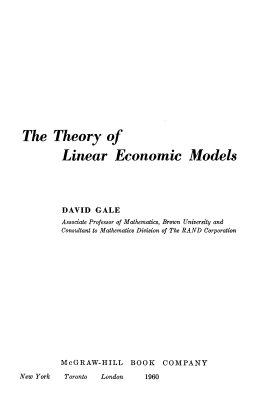McGRAW-HILL BOOK COMPANY, 1960, [352 pages]
This book is written at a time of revived activity in the field of applied
mathematics. "Revived" is perhaps the wrong word to use in this
connection, for the characteristic feature of the new applied mathe-
matics is not an intensification of work on old problems but rather an
attempt to extend the application of mathematical reasoning to
entirely new kinds of situations. Information theory, cybeetics,
game theory, theory of automata are but a few of the new disciplines.
Naturally, much of the work in these subjects is of a tentative and
experimental nature. On the other hand, there have been certain
developments which after a decade's experience seem to be of perma-
nent usefulness. One such is probably information theory. Another
is linear programming and the related linear models. Being con-
vinced that this latter subject is lChere to stay, " I felt it was appro-
priate to try preparing a suitable text. This book is the result.
Before asking the reader to plunge into the subject of linear models
I shall, in accordance with a sensible custom, attempt in the few pages
which follow to give some idea of what this subject is. An ideal
preface is one which tells the reader in a few words exactly what the
rest of the book contains and thus saves him the trouble of reading it.
I regret that the writing of such a preface in the present case is beyond
my powers of exposition. The best I can do is to describe in a general
way the sort of problems we shall be conceed with, the approach we
shall take to these problems, and the manner in which the relevant
material will be organized.
This book is written at a time of revived activity in the field of applied
mathematics. "Revived" is perhaps the wrong word to use in this
connection, for the characteristic feature of the new applied mathe-
matics is not an intensification of work on old problems but rather an
attempt to extend the application of mathematical reasoning to
entirely new kinds of situations. Information theory, cybeetics,
game theory, theory of automata are but a few of the new disciplines.
Naturally, much of the work in these subjects is of a tentative and
experimental nature. On the other hand, there have been certain
developments which after a decade's experience seem to be of perma-
nent usefulness. One such is probably information theory. Another
is linear programming and the related linear models. Being con-
vinced that this latter subject is lChere to stay, " I felt it was appro-
priate to try preparing a suitable text. This book is the result.
Before asking the reader to plunge into the subject of linear models
I shall, in accordance with a sensible custom, attempt in the few pages
which follow to give some idea of what this subject is. An ideal
preface is one which tells the reader in a few words exactly what the
rest of the book contains and thus saves him the trouble of reading it.
I regret that the writing of such a preface in the present case is beyond
my powers of exposition. The best I can do is to describe in a general
way the sort of problems we shall be conceed with, the approach we
shall take to these problems, and the manner in which the relevant
material will be organized.

